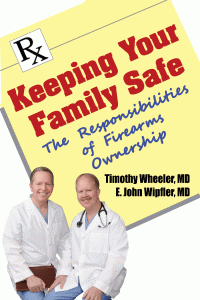With the expected mainstream media promo, the American Academy of Pediatrics (AAP) has released the new edition of its firearm policy, “Firearm-Related Injuries Affecting the Pediatric Population.” The usual media supporters of gun control didn’t disappoint. Check this article from Reuters, which didn’t even bother with a perfunctory balancing response from the Second Amendment Foundation or the NRA.
But that’s OK. The American public is much more educated about firearms than they were in 2000, the last time the AAP concocted their policy. Both the old and the new versions are little more than a gun control screed dressed up as science. News consumers these days are also more accustomed to media reporters and editors who see promoting liberal causes like gun control as part of their job.
Here are the main points of the AAP’s new and improved anti-gun policy:
1) Although the AAP concedes that firearm-related deaths in the 15-19 year age group have decreased nearly 60% since 1994, pediatricians still should work for more gun control.
2) The populations it studies to explain firearm deaths are high-risk youth in urban settings with little or no parental guidance regarding firearms or anything else. In other words, the AAP sees the demographics of youth with firearms as the demographics of violent urban juvenile crime. The far more numerous kids who compete in NRA-sanctioned state shooting matches, 4H shooting sports, scouting shooting competitions, local gun club youth shooting matches, or just the American tradition of fathers teaching their kids to shoot aren’t mentioned in the AAP policy. In fact the AAP has never acknowledged this demographic in its official literature on firearms. Why not?
3) According to statistics from the CDC, the National Safety Council and the National Center for Health Statistics, the rate of fatal firearm accidents has steadily fallen for the last 80 years and for children now hovers at an all-time low of about 2 per million children per year (Oh, wait, they didn’t include that in the report).
4) The Supreme Court’s 2008 Heller and 2010 McDonald decisions prohibit comprehensive gun bans, but pediatricians should still push for more gun control.
5) Pediatricians should still ask patients and parents about guns in their homes and urge parents to “prevent access to these guns by children.” The policy no longer advises parents to “remove them, especially handguns, from the home” as it did in the 2000 edition. The AAP sages apparently figured out how inflammatory the original policy was.
6) “The AAP recommends restoration of the ban on the sale of assault weapons to the general public.” They plow ahead in the face of persistent fears among congressional Democrats, to say nothing of Republicans, that resuscitating the 1994 Clinton gun ban is a lost cause and a sure loser.
7) “The [AAP] continues to support…the strongest possible regulations of handguns for civilian use.” Considering the draconian laws still in effect in places like New York City and Chicago, we can be sure that includes pretty much everything up to and including a ban on owning handguns.
If there was ever any doubt that the American Academy of Pediatrics means to advocate a ban on private gun ownership, this new policy should settle it once and for all. The rest of the country has moved on from the gun control scares of the 1990s. Back then, when drug crime was at its worst, medical gun control activists used scare tactics to push their agenda.
But over the last two decades violent crime has dropped dramatically, polls show far more support for the right to own guns, more women are learning how to shoot, and the Supreme Court has cleared up any doubts that that gun ownership is a constitutional right. All states but Illinois have adopted right-to-carry laws, allowing good citizens to discreetly carry firearms for self-protection. And modern sporting rifles—the dreaded “assault weapons”—are all the rage among hunters, target shooters, zombie hunters, and law-abiding home defenders.
But the leaders of the American Academy of Pediatrics prefer to remain in the past, refusing to leave behind an outmoded and pessimistic view of humankind, one that would deny people that most natural right, the right of self-defense. Increasingly the American people are leaving them behind.
Timothy Wheeler, MD is director of Doctors for Responsible Gun Ownership, a project of the Second Amendment Foundation.




